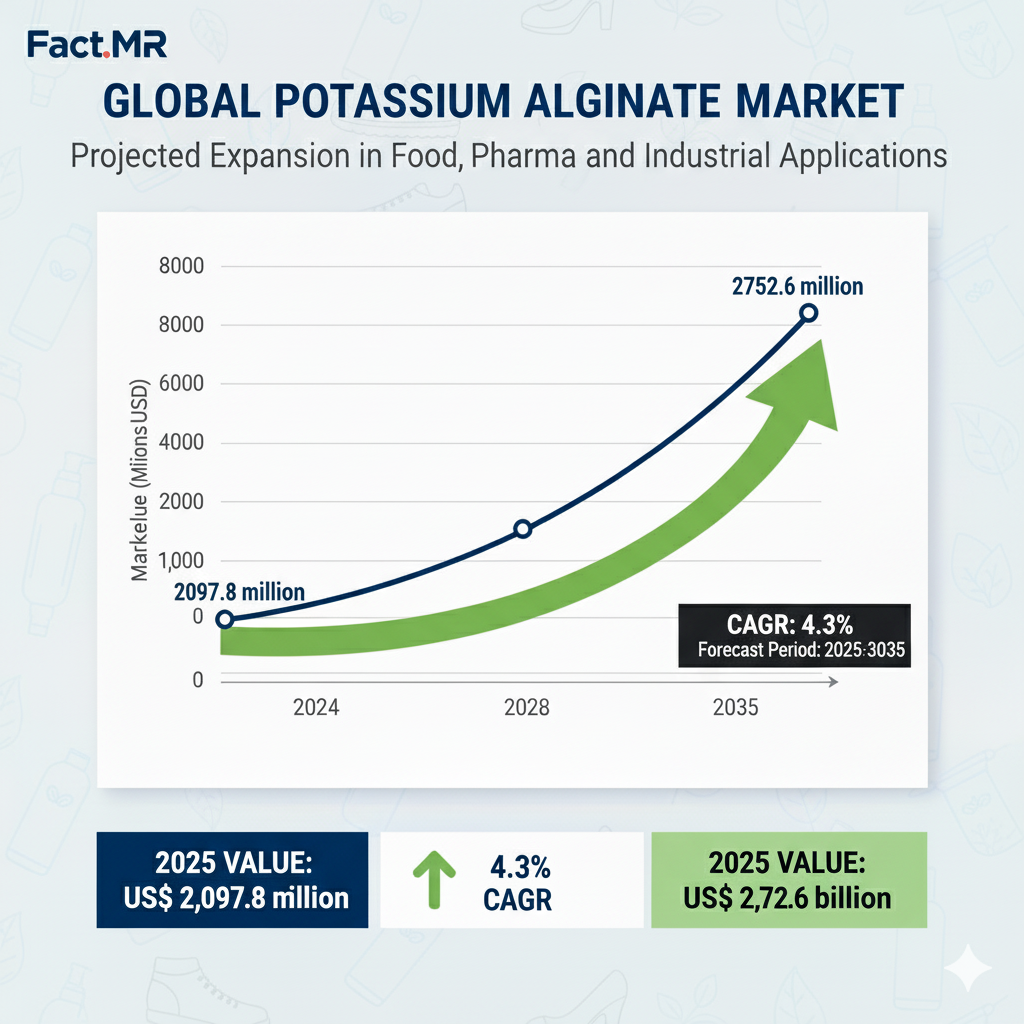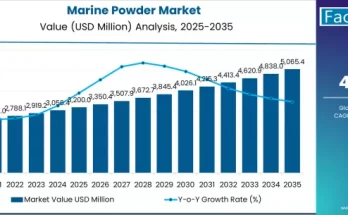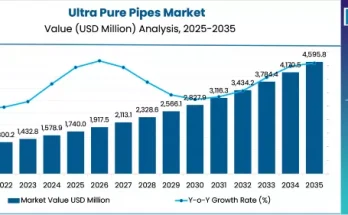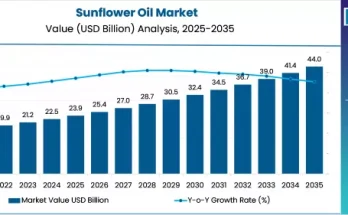Industry Leaders Eye Expanding Opportunities in Food, Pharma, and Industrial Applications – Fact.MR Study Highlights Robust Demand in Asia-Pacific and Sustainable Material Innovation
The global potassium alginate market is expected to be valued at USD 2,097.8 million in 2025 and will expand at a noteworthy CAGR 4.3% to end up at USD 2,752.6 million by 2035.The market’s acceleration is powered by its growing applications in food processing, pharmaceuticals, cosmetics, and agriculture, as manufacturers increasingly turn toward sustainable and natural stabilizing agents to meet clean-label consumer demand.
Food Industry Drives Core Market Expansion:
Potassium alginate, a natural derivative of brown seaweed, has become a vital ingredient in the food and beverage industry due to its ability to act as a stabilizer, thickener, and gelling agent. As global consumers demand healthier and more sustainable food choices, potassium alginate’s plant-based and non-toxic profile has positioned it as an indispensable alternative to synthetic additives.
In 2024, the food & beverage segment accounted for 45.5% of the global market share. Its demand is particularly pronounced in dairy alternatives, frozen desserts, sauces, dressings, and nutraceutical beverages, where it ensures product stability, uniformity, and shelf-life enhancement. The surge in plant-based and low-calorie dessert markets is pushing manufacturers to adopt alginate-based solutions that align with both performance and sustainability standards.
Asia-Pacific leads the global growth trajectory, fueled by rapid industrialization, a booming food processing sector, and rising consumer awareness about natural additives. Emerging economies like China (5.7% CAGR) and India (5.4% CAGR) are witnessing exponential consumption, solidifying the region’s dominance in potassium alginate production and application.
Pharmaceutical and Cosmetic Applications Gain Momentum:
Beyond food, potassium alginate is establishing a firm foothold in the pharmaceutical and cosmetics industries. Its biocompatibility, safety, and functional versatility make it a preferred choice for drug formulations, wound dressings, and controlled-release applications. In cosmetics, potassium alginate enhances product texture, improves emulsion stability, and acts as a natural thickener in creams, gels, and lotions.
“As the global market shifts toward naturally derived, bio-safe ingredients, potassium alginate’s relevance in drug delivery systems and skincare products is only expected to intensify,” said a senior analyst at Fact.MR. “It represents a convergence of functionality and sustainability that major manufacturers are now prioritizing in R&D investments.”
The increasing use of potassium alginate as a natural emulsifier also complements global sustainability initiatives. Its non-toxic, biodegradable profile aligns with consumer preference for eco-friendly ingredients and regional regulatory trends across North America and Europe promoting green chemistry practices.
Agriculture and Industrial Applications Strengthen Market Depth:
Potassium alginate’s benefits extend well beyond consumer products. In agriculture, it is being used as a biostimulant and soil conditioner, improving nutrient uptake, water retention, and crop resilience against stress conditions. U.S. agricultural applications are particularly noteworthy, where alginate-based fertilizers and growth enhancers are contributing to sustainable, high-yield farming practices.
Industrially, potassium alginate finds applications in textile printing, paper coating, and as a film-forming agent in packaging — all areas experiencing renewed interest in bio-based polymers. This versatility across industries underscores its status as a multifunctional, future-ready material.
Innovation, R&D, and Technological Advancements Accelerate Market Growth:
The potassium alginate market’s evolution is being propelled by technological innovations and R&D collaborations among leading global players. Companies such as Cargill, CP Kelco, DuPont Nutrition & Biosciences, FMC Corporation, and Qingdao Bright Moon Seaweed Group are at the forefront of developing new extraction and refinement techniques that enhance yield, purity, and cost efficiency.
In March 2022, CP Kelco introduced its new line of clean-label ingredients for plant-based meat alternatives, including gellan gum and citrus fiber, signaling a major push toward natural texture enhancers. Similarly, FMC Corporation’s 2024 partnership with AgroSpheres to deliver RNA-based agricultural solutions further highlights the industry’s focus on sustainable performance and green innovation.
Regional Insights: China and India Command the Future:
China’s unmatched production capacity, seaweed cultivation base, and export infrastructure continue to make it the epicenter of the global potassium alginate supply chain. The country’s integration into global trade networks ensures consistent, high-quality supply across industries.
India’s momentum, meanwhile, is anchored by urbanization, rising disposable incomes, and a surging food processing and pharma industry. The local demand for clean-label, plant-based ingredients positions India as a critical growth hub. The government’s biotechnology initiatives and sustainable manufacturing incentives further strengthen domestic production and import potential.
Challenges: Extraction Complexity and Cost Optimization:
Despite promising growth, the industry faces key challenges related to the complexity and cost of alginate extraction. The multi-stage purification and refinement process requires high energy input and advanced machinery. Manufacturers are therefore investing in enzymatic extraction techniques and process optimization to improve efficiency and yield.
Firms that successfully adopt energy-efficient and sustainable production technologies will not only lower costs but also strengthen their market positioning in an increasingly eco-conscious industry landscape.
Outlook: A Decade of Natural Ingredient Transformation:
Between 2025 and 2035, the potassium alginate market will witness a shift toward bio-based innovation, sustainability, and high-value applications. The short-term period (2025–2028) will be dominated by the food and pharma sectors, while the medium-term phase (2028–2031) will see cosmetic and biotechnology breakthroughs. The long-term horizon (2031–2035) will usher in new opportunities in regenerative medicine, biodegradable materials, and functional foods.
According to Fact.MR, industry leaders who prioritize supply chain resilience, sustainable sourcing, and advanced processing technologies stand to gain a strategic advantage. With increasing regulatory support and global consumer demand for natural, clean-label products, potassium alginate is set to remain a cornerstone of the bio-based material revolution.
Browse Full Report-https://www.factmr.com/report/potassium-alginate-market



